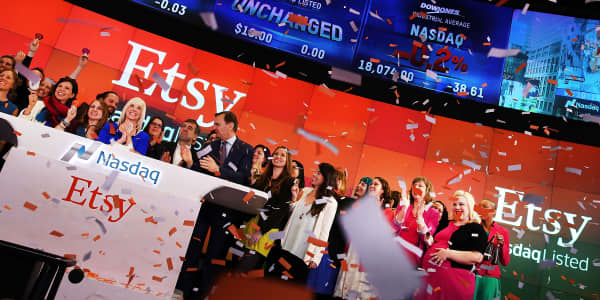The latest news on the CNBC Disruptor 50 companies upending the status quo in the markets:
America's most wanted: The sharing economy
In cities and towns across the U.S., a nefarious web of unregulated criminals is perpetrating such crimes as, well, renting out their rooms and homes to travelers who don't want to pay high hotel rates they could never afford in the first place.
Such are the strong feelings, and the growing reactions from regulators and communities, about the rise of the sharing economy in such highly regulated—and tax receipt friendly—industries as lodging and transportation. The latest of many examples comes from Silver Springs, Calif., where a committee of the Silver Lake Neighborhood Council heard complaints from locals worried about safety issues and traffic stemming from an increase in transient guests, according to a report from the Los Angeles Times.
It's just one more example in the "Wild West" of the sharing economy. Spain's tourism industry has cried foul over lost tax receipts from lodging. New York City recently took action in an attempt to make Airbnb operate according to rental regulations the company says shouldn't apply to it. Wall Street firm ConvergEx recently suggested the next Great Depression will be caused by the sharing economy's impact on consumer spending. And even the high brow New Yorker chimed in this past week with a column on the battle between the sharing companies and government regulators around the world. It argued that at some point, a deal is going to have to be reached by all parties that allows for regulation of the world's Airbnbs.
Airbnb, meanwhile, has been quoted throughout the ruckus as saying that with close to 200 countries now under its belt, it simply doesn't have the time to respond to every local government demand. Next up for Airbnb: Ireland, where it has just decided to set up its European headquarters. Ironic, since Ireland is where many "regulated," multinational corporations, including Google and Apple, set up international affiliates to avoid taxes. But that's perfectly legal and blessed by the world's governments.
(Read more: What happens in Vegas, stays in Vegas ... as data)
Twitter finally tweets what everyone's been waiting for
Yes, Twitter is planning to go public, and yes, the social media giant announced that it has filed an S-1 IPO document with the Securities and Exchange Commission via a tweet. And yes, Twitter started trending itself as a result of the IPO headline. As for the specifics, Goldman Sachs will be lead underwriter. Beyond that, the world knows nothing: Provisions of the JOBS Act allow companies with less than $1 billion in annual revenue to file for an IPO without releasing any information until such time as they begin marketing the deal to investors. So, at this point, we know what we always knew: at some point soon, Twitter would say its IPO was coming to the market. The big question on everyone's minds, beyond its valuation, is whether Nasdaq will get the deal after all of its recent hiccups.
Hollywood's new hitmaker: Kabam
While Hollywood recovers from its summer of epic fails among its epic movie offerings, Paramount's "The Godfather: Five Families," video game generated more than $100 million in revenue in its first two years on the market.
Mobile and social games are no longer low-budget marketing tools to promote film releases, and Hollywood has Kabam to thank for the new way that studios are looking at revenue from film-linked gaming, according to a report in Variety.
Over the past 10 months, Kabam's mobile game "The Hobbit: Kingdoms of Middle-earth" also has become a breakout hit and will generate more than $100 million by the end of the year from in-game transactions. No surprise that Warner Bros. and MGM, joining Google Ventures, have bought undisclosed stakes in Kabam this year.
(Read more: The Kit Kat surveillance state)
Car sharing on campus
College is the latest target market for the car sharing companies.
Lyft and Uber are tailing after a share of the 18-to-24 market by launching initiatives to get their names out among college students, reports USA Today.
Uber recently blanketed colleges and universities across the nation during welcome or orientation weeks, including stops at MIT, Boston University, Tufts, Emory and Georgetown.
Nest's copyright maneuvering heats up
Smart-thermostat company Nest Labs has struck a deal with Intellectual Ventures, one of the largest U.S. intellectual property holders, to license an unspecified number of patents from the IP giant.
Amassing a portfolio of patents has become a key strategy in the global arms race among tech giants, including Nest creator Tony Fadell's former employer Apple, and Nest is no stranger to copyright issues in its short history.
Honeywell filed suit against Nest in February 2012, claiming that Nest's flagship smart thermostat infringes upon at least seven specific Honeywell-owned patents. AllThingsD reported this week that the deal with Intellectual Ventures is likely a chess move by Nest in response to the Honeywell case and cases yet to come in the patent arms race—including, potentially, cases that could have been brought by Intellectual Ventures itself, which has been derided by some as a "patent troll."
(Read more: Debbie does data, as porn gets statistical)

Another ouch for Ouya
Game developers are unhappy. Game market gurus wonder whether Ouya will ever sell enough consoles to reach critical mass. ... Things have gone so great for Ouya since the big splash it made earlier this year in launching a new kind of video game console with free games. And now, add allegations of fraud to the issues Ouya has to fight.
Two Kickstarter projects tied to the Free the Games Fund, Ouya's fund-matching program for crowdfunded games headed to the console, forced Ouya founder and CEO Julie Uhrman to take to her blog this week as a way to stand behind her company's initiative.
In a Tuesday blog post, Uhrman referenced the success-stories-turned-scandals, writing "the intention behind our Free the Games Fund… seems to have been lost. ...This response surprised us—we thought this was going to be great—how could it not be?" she wrote. "We launched the Free the Games Fund to find great games from the very platform that gave us life. We wanted to make magic happen and help developers bring their games to Ouya."
Recent news of interest to the CNBC Disruptor 50 companies:
Dropbox has a Bill Gates complex
Dropbox CEO Drew Houston fashions himself a Bill Gates-like character, that is, way way back in the 1990s before Microsoft became a stodgy, slow-to-change tech giant who's CEO is on the way out, to the applause of the market.
Earlier this past week, speaking at the TechCrunch Disrupt conference, Houston said Dropbox had reached 200 million users, up from 175 million in July and 100 million in November.
Houston said the cloud-storage company has been pushing for growth on its enterprise side, while also courting developers to grow its number of apps and integrations. "We have that consumer and enterprise kind of crossover. Microsoft in the '90s is the company that most comes to mind in having this mass opportunity in both places."
Groupon in price war with HotelTonight?
Groupon has acquired last-minute hotel-booking app Blink, which is based in Spain and focused on the European market, for an undisclosed amount. HotelTonight recently announced it had raised a $45 million venture capital round of financing to help fund its expansion.
—By Eric Rosenbaum, CNBC.com.





